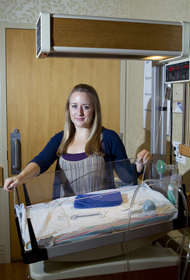Culture expresses itself in a myriad of familiar ways – our music, fashion, entertainment, literature. Perhaps less noted is the way that culture impacts our bodies including the very manner we are brought into the world and the food that nourishes us during gout first year of life.
As a graduate student in geography, Rebecca Lane turned to social theory to provide a more in depth understanding of the theoretical structures within her own discipline that inform her research on medical and feminist geography while benefitting from the perspectives of other graduate students and instructors outside her own discipline.
“I needed this type of knowledge,” said Lane when asked how social theory impacted her research portfolio. “Social theory gives you frameworks with which to look at the world, as well as ways to deconstruct it. There are these concepts and words like “culture,” “power,” “freedom,” that are used so frequently and without much thought. But what are these things? Social theory helps you envision what they might be and how they might work. It lets you examine these broad concepts in greater detail.”
Most recently Lane applied theoretical frameworks gleaned from authors she studied in her social theory classes to her masters thesis that looked at public breastfeeding. Through information in books and conversations with healthcare providers and peers, mothers are taught the acceptable ways to nurse their child in public. This public “performance” of a mother nursing her baby should come with its own training manual.
“Your performance as a breastfeeding mother in public space, by which I mean any space outside of the home, has to be very specific. It’s not like women innately know to cover up and ‘be discreet,’” explained Lane. “They learn to do it this way to fit into public space, which is really highly regulated especially in places like a restaurant. There are these social norms that shape the way that women perform certain aspects of motherhood, and it’s interesting because some women don’t breastfeed at all either in public or private because breasts are so sexualized and they think that babies and boobs shouldn’t mix.”

Lane describes how public spaces that we frequent in our community – the bank, the grocery store, the library – are all thought of as asexual places when in reality they are gendered spaces. And within that space, feminine sexuality is regulated such that women can show their covered breasts, but cannot reveal their breasts being used in a nurturing, motherly way.
For her dissertation, Lane plans take a step closer to birth and explore the influences of medicalized childbirth in Brazil. The largest country in South America, there is a large discrepancy between rich and poor Brazilians and this has an interesting impact on how Brazilian mothers give birth. The c-section rate in the private hospitals that provide care to wealthy women is an incredible 90 percent – the current c-section rate in the United States is approaching 40 percent – while poor women living in rural areas typically have homebirths. Lane believes this huge disparity in childbirth experiences provides a telling contrast in how society and cultural influence medical choices.
“When you think of childbirth, you think of something natural,” said Lane. “No one really questions obstetricians or the ways it’s done in hospitals, but in reality it’s only been done in hospitals in the last 100 years while women have been giving birth outside of hospitals for thousands and thousands of years. That’s where social theory comes in. It lets you question things that people wouldn’t normally question, things like science and medicine, which hold such authority in our society. You’re able to challenge doctors and the way they do things, as well as question why and how certain procedures have become the norm. You begin to see how medical knowledge works, and why women and men don’t even think there is another choice when it comes to hospital birth.”
But isn’t the option to choose a c-section over a vaginal birth a good thing? Doesn’t it empower women to make a choice about their own bodies and their individual childbirth experiences?
“Then social theory comes in and asks, ‘But what is power? Is it really just something being enacted upon a person?’ Even though these women are making the choice to have these c-sections, maybe power is working a different way. Perhaps power is diffuse and works in mundane ways and is not always just somebody forcing something upon you,” Lane responded.
As co-editor of the social theory journal disClosure, housed within the University of Kentucky, during the 2010-2011 academic year Lane will experience the reality of an academic publication from the inside. This year’s journal topic is “Law, Sex and Family.” Lane describes disClosure as the outworking of the way that social theory takes many different disciplines and draws them together.
“Disciplines generally have their own journals where the articles cover different topics from a narrow set of lenses. disClosure looks at one topic from a myriad of different perspectives,” said Lane.
As she launches her academic career, Lane believes her background in social theory will add depth and nuance to her research as well as giving her a perspective that goes far beyond the classroom.
“On an academic level, I’ve gotten new and different ways to approach my own research. On a personal level, it really changes the way you look at and think about the world. Social theory opens the door to so many possibilities, because it changes the way you look at things you usually take for granted.”
